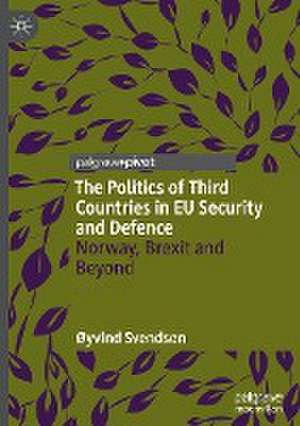The Politics of Third Countries in EU Security and Defence: Norway, Brexit and Beyond
Autor Øyvind Svendsenen Limba Engleză Hardback – 17 mai 2022
This book examines security and defence cooperation between the EU and third countries, in particular the United Kingdom and Norway. Brexit has placed the question of third-party engagement firmly back in the spotlight, especially given the UK’s significance as a security and defence actor, and the failure of both sides to agree terms for cooperation in this area. The book explains why the seemingly obvious need for cooperation and shared strategic interests alone does not lead to frictionless cooperation or integration between the EU and like-minded third countries. Adding a theoretical and conceptual depth to what is still largely an empirical topic, it draws important conclusions about the possibilities and limits of European security and defence cooperation during challenging times. It also raises key questions about the nature and suitability of the pre-existing security and defence architecture in Europe, and the place of non-EU members within it. The book will appeal to academics and students interested in European politics, EU security, and security and defence studies.
Preț: 381.59 lei
Nou
Puncte Express: 572
Preț estimativ în valută:
73.02€ • 75.74$ • 60.89£
73.02€ • 75.74$ • 60.89£
Carte tipărită la comandă
Livrare economică 27 martie-10 aprilie
Preluare comenzi: 021 569.72.76
Specificații
ISBN-13: 9783031009389
ISBN-10: 303100938X
Pagini: 77
Ilustrații: XII, 77 p.
Dimensiuni: 148 x 210 x 13 mm
Greutate: 0.26 kg
Ediția:1st ed. 2022
Editura: Springer International Publishing
Colecția Palgrave Macmillan
Locul publicării:Cham, Switzerland
ISBN-10: 303100938X
Pagini: 77
Ilustrații: XII, 77 p.
Dimensiuni: 148 x 210 x 13 mm
Greutate: 0.26 kg
Ediția:1st ed. 2022
Editura: Springer International Publishing
Colecția Palgrave Macmillan
Locul publicării:Cham, Switzerland
Cuprins
Chapter 1: Introduction: Old and New Challenges for Third Country Association in EU Security and Defence.- Chapter 2: Concepts of Third Country Struggles.- Chapter 3: Norway, the Willing Outsider.- Chapter 4: The Brexit Process and the Emerging Politics of Third Country Participation in EU Security and Defence.- Chapter 5: Conclusion: Lessons and Prospects for the Politics of Third Countries in EU Security and Defence.
Notă biografică
Øyvind Svendsen is a Senior Research Fellow at the Norwegian Institute of International Affairs (NUPI), and Associate Professor at Inland Norway University College of Applied Science.
Textul de pe ultima copertă
“This timely, short yet comprehensive volume offers a unique perspective on the evolving relations between the EU, Norway and the United Kingdom in the field of Security and Defence. An absolute must-read for both researchers and practitioners working on this moving target”.
-Benjamin Leruth, Assistant Professor, University of Groningen, the Netherlands
This book examines security and defence cooperation between the EU and third countries, in particular the United Kingdom and Norway. Brexit has placed the question of third-party engagement firmly back in the spotlight, especially given the UK’s significance as a security and defence actor, and the failure of both sides to agree terms for cooperation in this area. The book explains why the seemingly obvious need for cooperation and shared strategic interests alone does not lead to frictionless cooperation or integration between the EU and like-minded third countries. Adding a theoretical and conceptual depth to what is still largely an empirical topic, it draws important conclusions about the possibilities and limits of European security and defence cooperation during challenging times. It also raises key questions about the nature and suitability of the pre-existing security and defence architecture in Europe, and the place of non-EU members within it. The book will appeal to academics and students interested in European politics, EU security, and security and defence studies.
Øyvind Svendsen is a Senior Research Fellow at the Norwegian Institute of International Affairs (NUPI), and Associate Professor at Inland Norway University College of Applied Science.
Caracteristici
Assesses the politics of third-country association in EU security and defence Examines the third-country issue in light of Brexit Adds a theoretical and conceptual depth to what is still largely an empirical discussion
